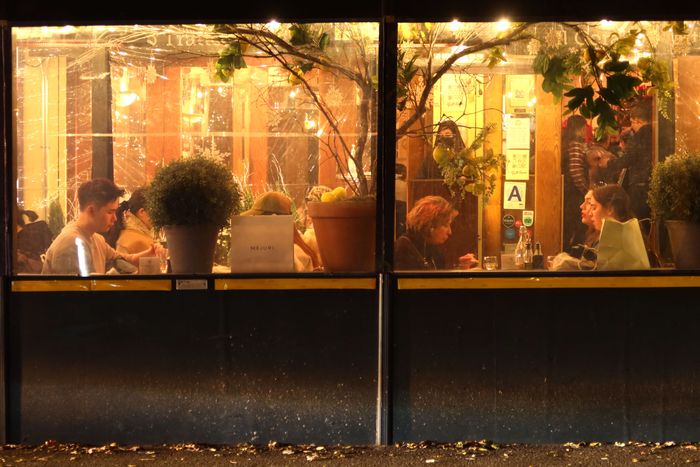
Last week, as the Omicron variant made its presence known in New York and a number of the city’s restaurants closed as a safety precaution, a bartender named Andy told me his bar would stay open for a holiday party even after members of the staff had tested positive for COVID. The day after that party, he followed up to let me know he too had now tested positive. “I feel crummy,” he wrote, “but I’ll be okay.” His bar, meanwhile, will now be closed through Christmas.
The “dramatic surge of cases” caused by Omicron, Dr. Jay K. Varma writes in the New York Times, means the variant “will almost certainly become the dominant strain in weeks — a process that took the Delta variant months.” (New York hit a record for cases for three days in a row, with 22,478 positive cases recorded on Sunday, while hospitalizations and deaths remain well below the peak. City data also show the unvaccinated continue to drive case numbers and hospitalizations.) The speed of Omicron’s spread has everyone in the city scrambling to adjust, and the restaurant industry is no different. Some places, like East Williamsburg’s Win Son Bakery and Williamsburg’s Bonnie’s, have shifted to takeout only. Estela canceled reservations on Friday night and closed for the weekend. Two days ago, Ho Foods, a shoebox-size Taiwanese restaurant, shifted to outdoor dining only, and as of this morning will be closed for the week. In Carroll Gardens, the popular Thai restaurant Ugly Baby will be shuttered until 2022, and Soho’s Mimi will remain closed until January 18.
One server described the situation at her pizzeria, where she works part-time, as “hour by hour.” Her shifts over the weekend were canceled, and now she’s in an employment limbo that feels eerily reminiscent of 2020. “There’s a concern about whether this is temporary or longer,” she says. “Not permanent in that the restaurant would not exist anymore, but just that I would have to try and get back on unemployment, which is another beast.”
Financial concerns exist for workers whose restaurants have remained open as well, as business has dropped. Late last week, a server shared that her Manhattan restaurant was empty save for some regulars. On Sunday, another server, who works in Brooklyn, told me, “I had one table last night.” A couple of hours after going into work, he said he had been cut for the night because there was no business. Enhanced unemployment got the server through long stretches without work, but he says he has made only enough money since then to stay above water — and he doesn’t know what he’ll do if his income disappears again. “If they don’t lock down and give us unemployment again, I think I need to move back home,” he says. “I’m totally out of money, behind on bills, barely making rent.” He says that without SNAP, he wouldn’t have money for food and would be eating only family meal. (It isn’t the case that business has dropped everywhere, though. You still can’t get a reservation at Dhamaka, and Fanelli’s was as busy as ever last Monday. My coworker Rachel Sugar says that yesterday on the Lower East Side “a bunch of restaurants looked closed with signs on the door and a bunch looked packed.” )
Some places that have temporarily closed are paying their staff — though that’s the exception, not the rule, in an industry where there’s no guaranteed paid time off. Those restaurants include Ridgewood’s Porcelain, which canceled its dinner service over the weekend, and Oxalis in Prospect Heights, which, partner and director of operations Steve Wong says, is paying staff their regular hourly rates. James Murphy’s the Four Horsemen, which has been temporarily closed since December 16, is also paying hourly staff to compensate for lost income. (A server at a fine-dining restaurant in midtown, meanwhile, says he was paid $600 for the nine shifts he missed because of quarantine, which he says is about as much as he makes in one night.)
The Turk’s Inn, a restaurant and performance venue in Bushwick, had only just reopened its dining room on December 8 for the first time in a year. “I think it was like the first real exhale that I had throughout the entirety of this entire saga,” says co-owner Varun Kataria. “It was a feeling of kind of failure, and to get that place opened meant the business was sort of back on all its legs.” One main concern is line cooks, who were all recently hired. Kataria is worried about losing them because of the decision to close unless he can continue to pay them, something he says he’s “working on.”
Right now, it’s expected that Omicron will peak in New York sometime in January. Workers and owners alike are expressing uncertainty about the next few weeks and how that will play out. Will there be more temporary shutdowns? Some wondered if they would be out of work.
“The thing that I’m grappling with is that I don’t know substantially what will change in, like, the ensuing weeks,” Kataria explains. Hitting pause at Turk’s Inn was, he felt, the right thing to do, “but I don’t see this necessarily staunching the continued flow of new infections.” He foresees a future in which dealing with Omicron and positive COVID infections among staff becomes something like the norm: “Once we return to business, we’re going to be basically operating in that landscape.”
Even staffers who remain healthy are worried about the next few weeks. “I feel fine personally regarding my health,” says Zoë Flood Tardino, the lead line cook at Porcelain. “I’m worried about the big picture — the mental-health part scares me more.”





